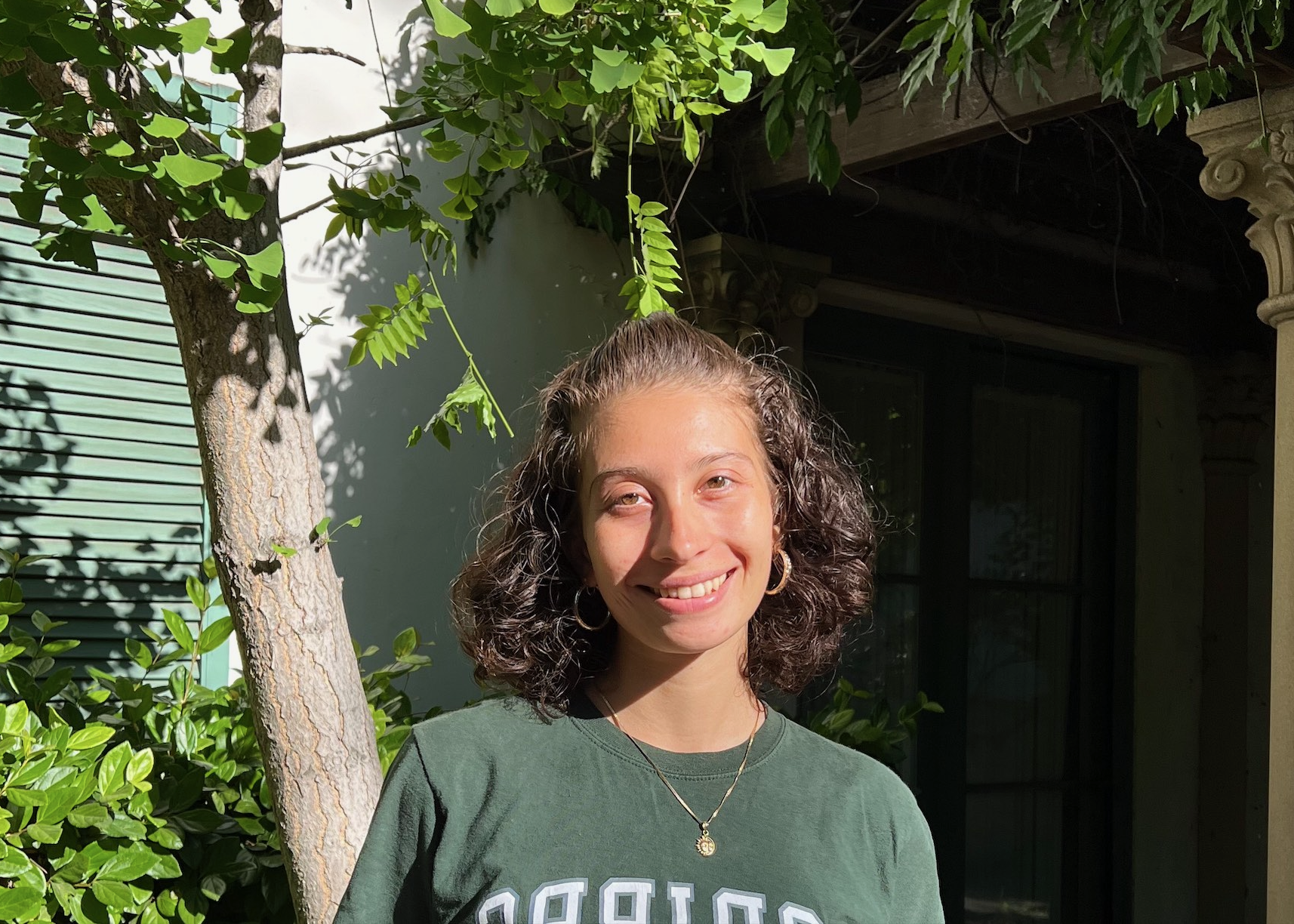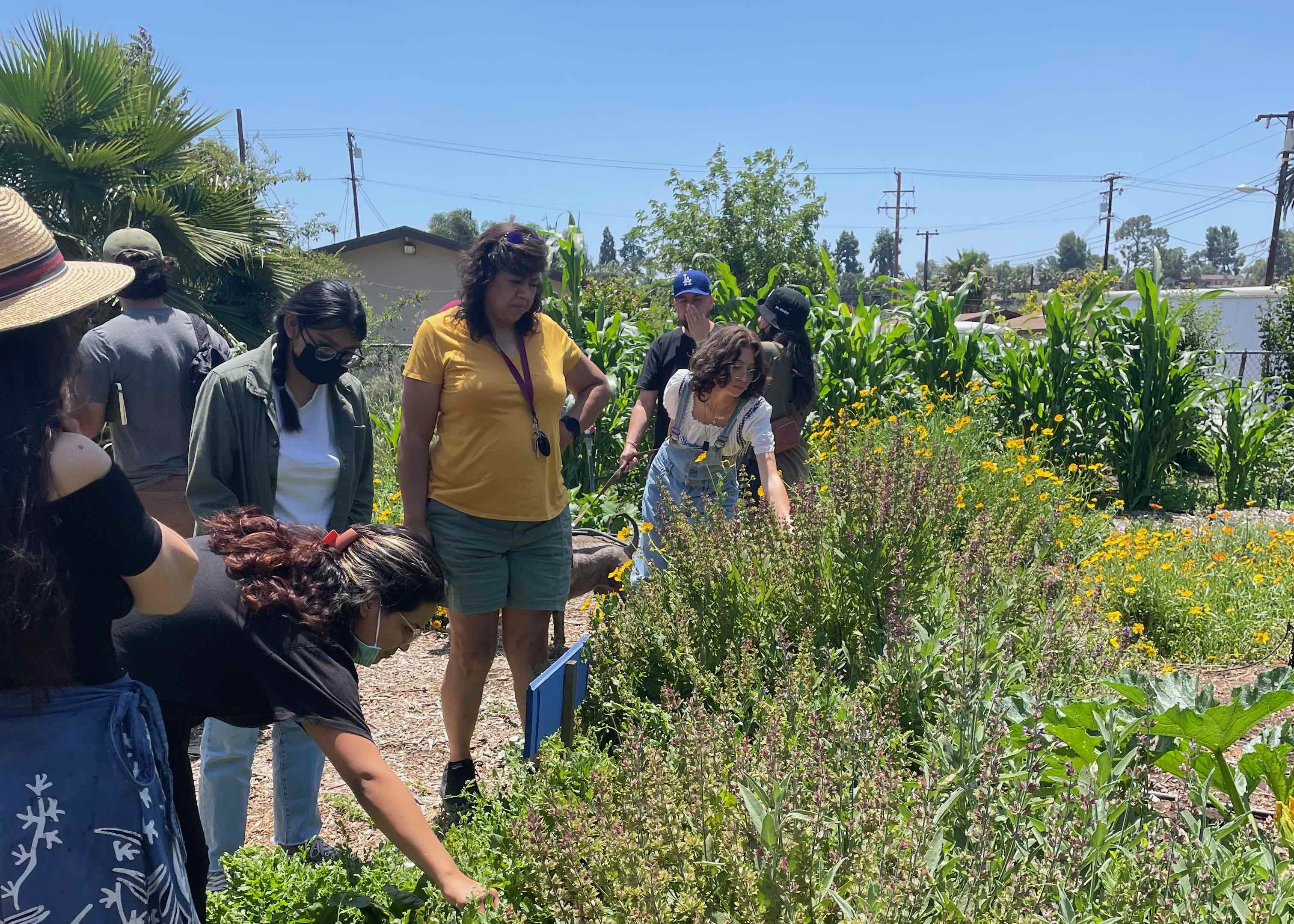By Emily Glory Peters

Lizbeth Valdivia-Jauregui ’23, a 2022 Racial Justice and Equity Fellow
More than fruits and flowers are thriving at Buena Vista Community Garden in Pomona, California. The stories of Southern California’s marginalized communities have roots here, too, passed between visitors and gardeners alike.
But how exactly is that culture preserved—and what kind of restorative significance do these green spaces hold? These are questions Lizbeth Valdivia-Jauregui ’23 plans to answer in her research as one of Scripps’ new Racial Justice and Equity Fellows.
A Community Garden, a Cultural Safe Haven
Centuries of expanding European influence has reduced the spiritual, economic, and political strength of these marginalized groups, Valdivia-Jauregui says—particularly for Indigenous people. A multiethnic community garden presents a special gathering spot to deepen relationships with nature and ensure their traditions aren’t lost.
“My study addresses two major gaps in knowledge: how Indigenous, immigrant, refugee, and low-income people transmit cultural and ancestral knowledge within a community garden, and how this can fit within a transcultural model of healing,” the psychology major says, noting that her interest in therapy helped shape her aims for the project. “I’ll be interviewing Tongva, Black, and Indigenous Buena Vista Community Garden members to explore their perspectives and experiences of the garden as a space of cultural transmission.”
As someone with ties to Tongva land, today known as Pomona, Valdivia-Jauregui’s project is personal as it is practical. She’s volunteered at the community garden for more than two years since COVID-19 hit, building relationships with members and absorbing shared knowledge through elder-led workshops teaching on everything from medicinal herbs to composting with local youth. The garden even hosts “toxic zone tours” so Pomona families know—and can avoid—where industrial waste has been dumped near the garden and in their backyards in the south side of Pomona.
All of it, the rising senior observes, are tools to combat the cultural stripping of those who first lived on and tended Southern California land before colonization and industrialization.
“While Amazon is trying to take over the residential areas in the Inland Empire, green spaces have been spaces of healing for low-income people. They can take no-cost, pesticide-free produce to their homes; we have cookouts, harvests,” she explains. “For me, it’s a bigger institutional thing—yes, we have these toxic zones in Pomona, and we need these green spaces and more work to be done so the voices of these individuals are heard. There’s a lot of environmental racism.”
Donor Support Making a Difference for Scripps Students and the LA Community
Valdivia-Jauregui’s project is fully donor-funded, made possible through Scripps College’s Racial Justice and Equity Fund.
Powered by a million-dollar gift from Scripps parent and trustee Gale Picker P’14, P’19, the fellowship is just one of several initiatives centered on diversity, equity, justice, and inclusion. Valdivia-Jauregui joins Molly Yeselson ’23 and Mica Barrett ’23 in the program’s second cohort of students pursuing antiracist scholarship.

Members at Buena Vista Community Garden
Having already cut her teeth on research—she contributed to a paper that was published last year—Valdivia-Jauregui plans to incorporate her fellowship findings into her senior thesis. Ultimately, she’ll share her findings at Scripps with the hopes of impacting the greater Claremont Colleges community.
“I want to inspire action,” she says. “This research can highlight the impact that these big institutions like The Claremont Colleges can have in supporting green spaces and bridge that gap between the 5Cs and Pomona community gardens organizing around food access and sovereignty. That’s really important for me.”
After all, Valdivia-Jauregui adds, the College has its own community garden—so if anyone knows the power of planting together to make positive change, it’s people like Scripps students. They’ve been involved in mutual aid efforts with community gardens to help combat food insecurity across the Inland Empire. That’s what donors support when they give to Scripps, she says, noting that redistributing wealth is a key component to sustaining these green spaces. She hopes donors will continue to make their financial support of programs like the Racial Justice and Equity Fellowship a priority.
“The US was Indigenous land. There’s always that need to highlight and uplift and empower non-Euro individuals, especially on our campuses and beyond,” she says. “I’m thankful to Scripps’ donors because it’s important that they’re taking the time to invest their money in these issues to help provide reparations against the hatred that runs deep in our nation’s racial history.”
Scripps’ Racial Justice and Equity Fellowships help students and faculty advance antiracist work on campus and in the community. To make a gift, please click here.

